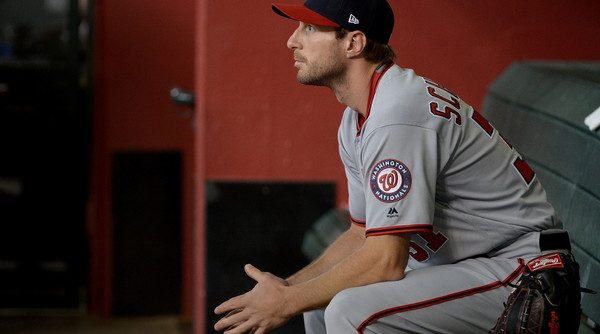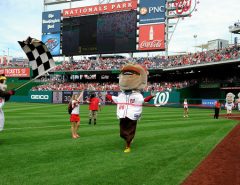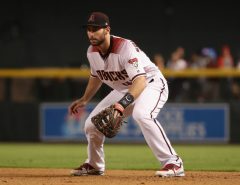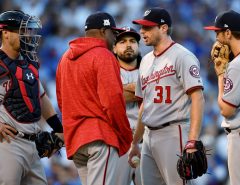If you follow the Washington Nationals closely, you know that the Lerners, owners of the franchise, and General Manager Mike Rizzo have put together a “stars and scrubs” team for the past few years. They designed it to have the majority of the payroll tied up in elite (and marketable) players with minimal money put into depth. It is hard to say it is not working, considering that after nearly 100 games the Nationals have somewhere between three and five MVP candidates and a double-digit lead in the division. With a plethora of injuries testing the limits of that thin depth, stakeholders all over are wondering if they will be able to hold up to losses to key players. With that said, here is a look at the replaceability of key players within the Nationals organization.
First, a look back to 2016. The losses of Stephen Strasburg and Wilson Ramos in September cost them their second-best pitcher and hitter, respectively. Unable to fully cover for those hits (shown especially when they had Joe Ross start Game 4, himself barely returned from injury), they lost a heartbreaking five-game series. This is not a requiem for what might have been but instead serves to point out that these were two highly irreplaceable members of the team. It made me wonder who would be the hardest to replace on this team if they were to miss the playoffs, and if that would point to necessary moves over the coming days that would mitigate some of that risk. Without further ado, here is a ranking of the most irreplaceable Nationals, starting with the most irreplaceable.
100% Irreplaceable
Max Scherzer – The best player at the team’s most scarce position, how could it not be Mad Max? While he went 0-2 against the Dodgers last year, that only makes me trust that he will be a force in the playoffs this season. He can be scary when the pressure is up or he gets angry: playoff situation plus the memory of 2016 offers both. The Nationals cannot hope to go deep into the playoffs if he is not pitching.
Internal Replacement: Erick Fedde I guess…? There is no internal replacement.
Stephen Strasburg – No, this has nothing to do with the 2012 Shutdown®, a ridiculous and dated discussion. This has everything to do with his ability to dominate games when he’s at 100%. It is no secret that he has missed two of the Nationals’ three postseasons, none of which they have won. It certainly would help to finally have him healthy and strong for October.
Internal Replacement: Yeah, it’s the same as Scherzer… You’ll see a theme here.
Bryce Harper – While outfield is where the Nats have the most depth, Harper brings an energy and fear factor that no one else can. He consistently plays at a high level in big situations and is a proven postseason performer. While there is big league talent able to replace him, almost no one in the sport could sufficiently fill his shoes, let alone within the system.
Internal Replacement: Brian Goodwin or Michael A. Taylor
Very Hard to Replace
Gio Gonzalez / Tanner Roark – Get the point? The Nationals cannot afford to lose a starter. These two are a level below Stras and Max because they are far more likely to have a start that is replacement-level bad. Still, having to thrust the team’s fifth or sixth starter into service in Game 3 or 4 is exactly what the Nationals must avoid.
Internal Replacement: Fedde or Edwin Jackson
Trea Turner – The perception of the loss of Turner has been dampened by the lack of necessity for wins in recent weeks. Still, it is obvious that the offense suffers without him. On Tuesday, they were shut out for the third time in twelve games, having previously not been held scoreless the entire season. A large piece of that is the speedster’s absence. Plus, consider the nature of playoff baseball. Runs come at a premium and speed is the difference between scoring from second and being thrown out. Go watch a video of the 2004 ALCS and pay attention to Dave Roberts — he is the poster child for how running can change a game. Speed can break championship droughts. Turner can be the catalyst for a decision run in late innings.
Internal Replacement: Stephen Drew or Wilmer Difo
Hard to Replace
The Rest of the Infield – I hate to group these guys together because they all do not have the same level of contribution nor the same talents. Still, it made sense because they are replaced by essentially the same people, but offer skill sets that can be more easily replicated than Turner’s. Losing Anthony Rendon or Daniel Murphy would probably be the biggest setback, but Drew is capable of having a hot week in Murphy’s stead and Difo is a slick defender that can be an acceptable fill in for Rendon’s elite defense. Adam Lind could match Ryan Zimmerman’s offense, but the subtraction in defensive ability makes it a tough pill to swallow as well. While Matt Wieters has struggled recently, neither Jose Lobaton nor Pedro Severino has offensive upside anywhere near that of Wieters. Either one would be a hole in the lineup that rivals the pitcher spot.
Internal Replacement: Difo, Lind, Drew, Lobaton / Severino
Sean Doolittle and Ryan Madson – The saviors of the much-maligned bullpen are in a league of their own relative to the other relievers because of their clear superiority. Madson especially has looked special since being acquired. With his age and Doolittle’s past health issues, it would be wise to limit their work somewhat. The reason they aren’t higher on the list is that they can actually be more easily replaced on the trade market, and a move for relievers even past the non-waiver deadline has proven possible for the Nats (Matt Thornton in 2015 and Marc Rzepczynski in 2016).
Internal Replacements: Anyone who is having a good September in the minors might be the best option if desperate.
Relatively Easy to Replace
Jayson Werth – As sad as this is to say, even if Werth is fully healthy by the time the playoffs roll around he may not be starting. Goodwin and Taylor have been so effective as starters this season that they may force Dusty Baker to play one or both of them. For once, the Nats might have a good depth problem, and that is okay. Werth will be given every chance to start, but if he doesn’t regain his pre-injury form, that will not be the team’s downfall.
Internal Replacements: Goodwin or Taylor
The Bullpen – This may actually be an understatement considering five pen arms have actually been worse than replacement level (according to fWAR). While losing guys like Enny Romero or Matt Albers would be worse than others, it is hard to suggest that they are not the most easily replaced guys on the team.
Internal Replacements: They are their own replacements, considering they have used 15 relievers this season and only Blake Treinen is not still in the system.
So what does this all mean? Long story short, there is an obvious starting pitching problem and losing Harper would suck. Shocking! In all seriousness, this makes it clear that while this team has risks like any other, the risks are lopsided in the starting pitching area. The Nationals can make a deep playoff run and the best way to help themselves guarantee a great chance at that is giving themselves some slack by picking up another starter at the deadline.
Tags: Bryce Harper, Gio Gonzalez, Jayson Werth, Matt Wieters, Max Scherzer, Nationals, Nats, Ryan Madson, Ryan Zimmerman, Sean Doolittle, Stephen Strasburg, Tanner Roark, Trea Turner, Washington Nationals




Leave a Reply